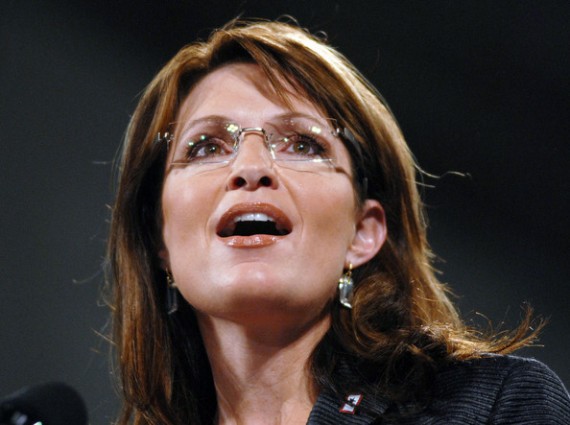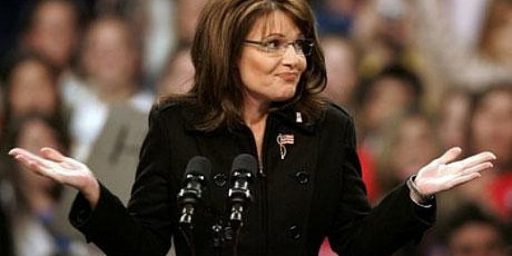Sarah Palin Viewed Unfavorably By 60% Of The Public
The crater that Sarah Palin’s poll numbers fell into in the wake of her bizarre actions after the Arizona shootings has gotten even deeper:
Sixty percent of Americans have an unfavorable view of Palin, the 2008 Republican nominee for vice president, while 28 percent view her favorably. Since December, she has dropped 3 percentage points among Republicans, 7 percentage points among both independents and Tea Party supporters and 3 percentage points among Democrats.
The media speculation aside, these numbers lead me to think that Palin won’t run for President. You’d have to be completely deluded to think you could recover from this kind of negative first-impression, and even Palin isn’t that wacky. Right?






I think that the real question is why 60% of americans hate freedom.
28% of the electorate is insane.
That’s the bottom limit for the “Crazy Factor”.
28% of people still supported Richard Nixon when he resigned.
28% of people in Illinois voted for Alan Keyes against Barack Obama.
29% of people believe Obama was not born in the USA.
27% of people believe 9/11 was a Bush inside job.
28% of the population supports Sarah Palin.
Yeah, yeah… there are polls and there are polls.
Given the impact that the Tea Party had last November, anyone who thinks Palin doesn’t stand a chance in 2012 is a fool.
Patrick,
On online poll conducted on a conservative blog means nothing
wow…a HOT AIR poll??? thats damning evidence alright.
youve gotta be doing satire, right?
>Given the impact that the Tea Party had last November, anyone who thinks Palin doesn’t stand a chance in 2012 is a fool.
I presume you’re hoping Palin will be a bit more successful than Christine O’Donnell, Sharron Angle, Joe Miller, and Carl Paladino. The problem is that the TP success stories like Marco Rubio and Nikki Haley were not the ones who had acquired a toxic reputation with the American public.
>online poll conducted on a conservative blog means nothing
True…but it’s also worth noting that the poll doesn’t even contradict the findings of the Bloomberg survey. It shows 34% of respondents favoring Palin for the Republican nomination, putting her above any other single candidate. The Bloomberg poll concerns her favorability among the general public, not Republicans.
“28% of the electorate is insane. “
This must be true. The poll said 28% thought the country was on the right track (as opposed to the 63% who said it’s on the wrong track).
Doug,
I beg to differ. It’s only the conservatives who will be voting for the candidate who runs against Obama so this poll is highly indicative of for whom they will be voting. And, from the details of the poll, the vast majority of those participating in the poll identified themselves as being members of the Tea Party.
Again, the Tea Party made an undeniable impact last November and they will also be felt again in 2012.
>It’s only the conservatives who will be voting for the candidate who runs against Obama
Strictly speaking, that isn’t correct. First of all, it is Republicans, not “conservatives” per se, who will be the main voters in the primaries. Second, some of the primaries are “open primaries” in which independents can vote. Palin will probably need to win in some open-primary states such as SC, in order to get the nomination. If she can’t broaden her appeal beyond the GOP, that’s unlikely to happen. (Of course, if she doesn’t broaden her appeal beyond the GOP, she won’t win in the general election in any case.) I’d like you to explain to me–and I’ve never heard a Palin supporter explain this–how she will manage to broaden her appeal.
You make the typical mistake of confusing ideology (conservative) with political parties. The voting populace of this country is primarily made of three voting blocks, the Democrats, the Republicans and the independents and they are roughly equal in size. Many of the independents consider themselves very conservative, more conservative than Republicans in general. And those independents identify with the Tea Party.
Any candidate in 2012 will need to capture a majority of the independent’s votes in order to win, which means they will need to appeal to the Tea Party. Exactly what proportion of the independents are Tea Party people can’t be determined but I would guess that it’s a majority of them.
If this is the case, it will be the Tea Party who decides the elections in 2012. And the Hot Air poll indicates who that will be.
You make the mistake of confusing optics with reality. Yes, the Tea Party types had a certain effect on the 2010 elections, but to inflate that they will “decide” the elections of 2012? Perhaps certain Republican primaries, but, remember, the president will be running for reelection with a billion bucks to spend, so his base will be energized as well. It would be quite delicious if the Tea Party types helped to make Sarah Palin the GOP presidential nominee only for her to lose spectacularly to the president…
I really didn’t think it was possible for Palin’s numbers to go any lower with Democrats.
Actually, I think this makes it even more likely she will run. Palin doesn’t actually want to be president; if she runs it will be because she thinks it will help her media career. A sure fire loss that makes it easier for her to play the martyr (see how everyone is against us real Americans?) is the perfect race for her.
>You make the typical mistake of confusing ideology (conservative) with political parties.
Um…I just pointed out that “Republican” is not automatically the same thing as “conservative,” and now I’m the one confusing ideology with political party? What, did you step out of Lewis Carroll novel or something?
>The voting populace of this country is primarily made of three voting blocks, the Democrats, the Republicans and the independents and they are roughly equal in size.
Yes. And Republicans are, in fact, the only bloc with a favorable view of Sarah Palin, and only a minority of Republicans consider her qualified to be president. She is vastly unpopular among independents, as the Bloomberg poll notes (and has been noted by countless earlier polls).
>Many of the independents consider themselves very conservative
Of course. But many more independents do not. According to a 2009 Pew survey, for example, just 33% of independents identify as conservative–which was a rise from previous years, but still a minority.
>And those independents identify with the Tea Party.
Actually, the TP is overwhelmingly Republican:
>Any candidate in 2012 will need to capture a majority of the independent’s votes in order to win
That is generally but not always true. It is possible to win a presidential race without capturing a majority or even a plurality of the independent vote. Carter did in ’76, as did W. in ’04.
>which means they will need to appeal to the Tea Party
That doesn’t follow. The TP constitute a distinct minority of the electorate, a distinct minority of independents, and the majority of them are Republicans anyway. The Republican candidates will have to appeal to them to win the nomination, but Obama has no need to win over a group that didn’t vote for him in the first place.
>Exactly what proportion of the independents are Tea Party people can’t be determined but I would guess that it’s a majority of them.
It is not a good idea to guess at things for which there is abundant data. Around 35-40% of Americans identify as independent, whereas just 18% of Americans support the Tea Party. Considering that only a minority of TPers identify as independent, that suggests that they constitute a small slice of independents.
It’s only the conservatives who will be voting for the candidate who runs against Obama so this poll is highly indicative of for whom they will be voting.
No, it’s moderately indicative of whom Hot Air visitors who bother with online polls will be voting for. Even that is pretty shaky, as all online polls are.
Then why did the Tea Party make such a big impact in the 2010 elections? I have heard for years that the Tea Party is just a flash in the pan, that it didn’t really exist, that it is just a sub-set of the Republican party, whatever. And now you have staunch Republicans such as Oren Hatch who are actively courting the Tea Party for their very survival.
But that’s okay, because what was done last November can be repeated again in 2012. And there will be all kinds of analysis as to what it all means by people who still just don’t get it.
Off year election + highly motivated group = victory…
Don’t forget the tea party also lost spectacularly in several races 😛
Oh and…
Primary challenge =/= general election
I’m done spamming now 😛
WTB edit button..
>Then why did the Tea Party make such a big impact in the 2010 elections?
Because their impact was largely on the GOP itself. The TP has been highly effective at using primary challenges to push the GOP rightward, both by replacing establishment Republicans with TP alternatives and by scaring others like McCain and Hatch into moving themselves to the right to fend off primary challenges.
But the TP didn’t cause the big gains Republicans made. In a year with near 10% unemployment and deep dissatisfaction with the people in power, it was almost inevitable the Dems would suffer big losses and probably lose the House. The public did vote for many of the TP candidates, but that had more to do with punishing the Dems than it had to do with supporting the TP. Indeed, there’s considerable evidence that nominating the TP candidates decreased the GOP’s chances of picking up key seats. For example, by all accounts Harry Reid should not have won reelection. He was deeply unpopular, and in an anti-Democrat and anti-incumbent year, he should have been a sitting duck. The polls showed him trailing by double digits to the establishment GOP choice, Sue Lowden. But after TP favorite Sharron Angle was nominated, the race suddenly became competitive, and he went on to win, not because his own popularity surged, but because Angle managed to alienate enough voters that they decided he was the lesser of the two evils.
Similarly, the TP practically gave Democrat Chris Coons the Senate seat in Deleware by nominating the unelectable Christine O’Donnell over the highly electable Mike Castle, who polls showed would have easily trounced Coons had he been the nominee. Even for a TP success like Rand Paul, polls showed that Republicans would have had an easier time winning with an establishment Republican. The nomination of Paul made the seat competitive, when it would not have otherwise been.
I’m not saying there’s anything intrinsically wrong with using primary challenges to remake a party. It was an effective way for the TP to get its favored candidates into office, in a year that was going to be bad for Democrats no matter what. But the TP candidates who won the seats did so mostly because they were Republicans, not because they were tea-partiers. In most of those races, any Republican would have won. Nominating TP candidates didn’t increase their chances of winning, and in several cases it clearly decreased it.
>But that’s okay, because what was done last November can be repeated again in 2012.
It can be, but there’s no reason to believe it will be. There is no known correlation between midterm elections and the subsequent presidential election. If there is any correlation at all, it is a negative one. Reagan and Clinton suffered devastating midterm defeats but went on to be easily reelected. In contrast, Carter and Bush Sr. endured relatively modest losses yet were voted out of office two years later. Bush Jr. actually gained seats during his first midterm–which is almost unheard of–yet he was just barely reelected, with a narrower margin in the popular vote than any other incumbent president in history. In short, midterm results don’t tell us much about the upcoming presidential race, for better or worse.
>I have heard for years that the Tea Party is just a flash in the pan
I totally agree that many pundits underestimated the impact of the TP. But I haven’t based any of my arguments on the opinions of pundits. I’ve been basing it on hard data, which you so far have not addressed.
You still haven’t answered my question: how do you think Palin will broaden her appeal in the next two years? Let me put it simply: candidates with 60% unfavorable ratings do not win elections. Presumably, you believe those ratings will decline greatly in the next two years. I want to know how you think this will be accomplished.
> Given the impact that the Tea Party had last November, anyone who thinks Palin doesn’t stand a chance in 2012 is a fool.
Given the speed at which the right is self-destructing since then, well, one has to wonder who the fool is…
> Then why did the Tea Party make such a big impact in the 2010 elections?
Well, they did cost the GOP control of the senate, but most folks outside of the Foxverse figure that is a net win for the Democrats, not the tea party.
To answer your question, she doesn’t need to broaden her appeal and I don’t believe her unfavorable ratings are at 60%. In other words, I don’t believe this poll any more than the other commenters here believe the Hot Air poll. Depending on how you phrase the question and who you ask, a poll can generate any predetermined results. I haven’t given any credence to polls since the exit polls predicted that John Kerry was the new president in 2004.
That was the point of my original comment here.
>I haven’t given any credence to polls since the exit polls predicted that John Kerry was the new president in 2004.
In an election in which the winner’s margin was 2.4 percentage points, early exit polls skewed the results enough to project the wrong winner. But how does that support your conclusion that a scientific poll “can generate any predetermined result”? To support your belief that Sarah Palin has enough current support from the nation at large to win the presidential election today, you’d have to argue that every scientific poll ever conducted about her favorability is off not by a few percentage points, but by at least 20-30 percentage points. From September of last year to today, all the major pollsters–CBS/Times, NBC/WSJ, Gallup, CNN, Quinnipiac, ABC/Post, Fox, Rasmussen, and so on–have shown her to have at least 49% unfavorable ratings, and 60% at the highest. Please tell me a single example of an established scientific pollster in modern times miscalculating a political race by 20-30 percentage points. If you can’t tell me any such examples, then you’re effectively admitting you have nothing to base your views on.
Patrick:
I like Hot Air, I go there all the time…but 34% on an online poll there tells you nothing about who will and will not win the nomination. Hot Air is not really all that indicative of the overall Republican rank and file..and on line polls are not scientific..look at this way, if you believe that poll, then 66% of the conservatives polled did not support Palin.